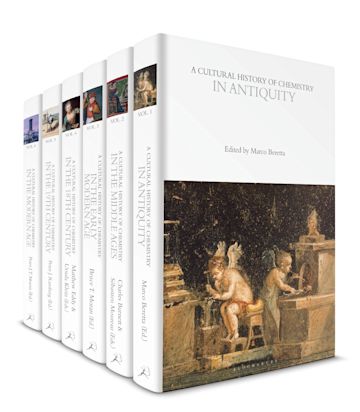
Editor: Bruce T. Moran (University of Nevada at Reno)
Publisher: Bloomsbury, 2022
From prehistoric metal extraction to medieval alchemy to modern industry, chemistry has been central to our understanding and use of the physical world as well as to trade, warfare and medicine. In its turn, chemistry has been shaped by changing technologies, institutions and cultural beliefs. A Cultural History of Chemistry presents the first detailed and authoritative survey from antiquity to today, focusing on the West but integrating key developments in Egypt, Mesopotamia, and the Arabic-Islamic and Byzantine empires. The third volume covers the Early Modern Age (1500 to 1700).
Contents
List of Illustrations
Series Preface
Introduction: Chemistry, Shifting Meaning, and Shapes of Experience in the Early Modern Era, Bruce T Moran
1. Theory and Concepts: Conceptual Foundations of Early Modern Chymical Thought and Practice, Lawrence Principe
2. Practice and Experiment: Cultures of Chymical Analysis, Joel A. Klein
3. Laboratories and Technology: Chymical Practice and Sensory Experience, Donna Bilak
4. Culture and Science: The Development and Spread of Chemical “Knowledges” across Evolving Cultures and Communities, Andrew Sparling
5. Society and Environment: The Social Landscape of Early Modern Chemistry, William Eamon
6. Trade and Industry: Chemical Economies and the Business of Distillation, Tillmann Taape
7. Learning and Institutions: Chymical Cultures at Courts and Universities, Margaret Garber
8. Art and Representation: Skepticism and Curiosity for the Alchemist at Work, Elisabeth Berry Drago
Notes
Bibliography
Notes on Contributors
Source: https://www.bloomsbury.com/us/cultural-history-of-chemistry-9781474294928/